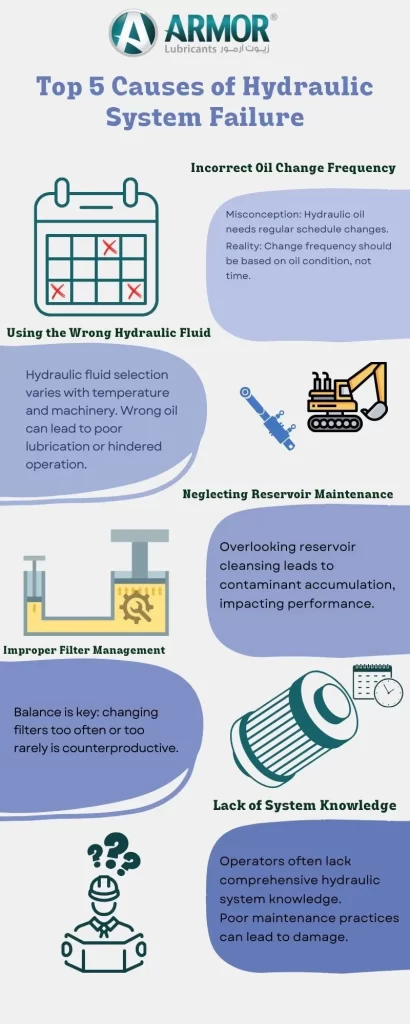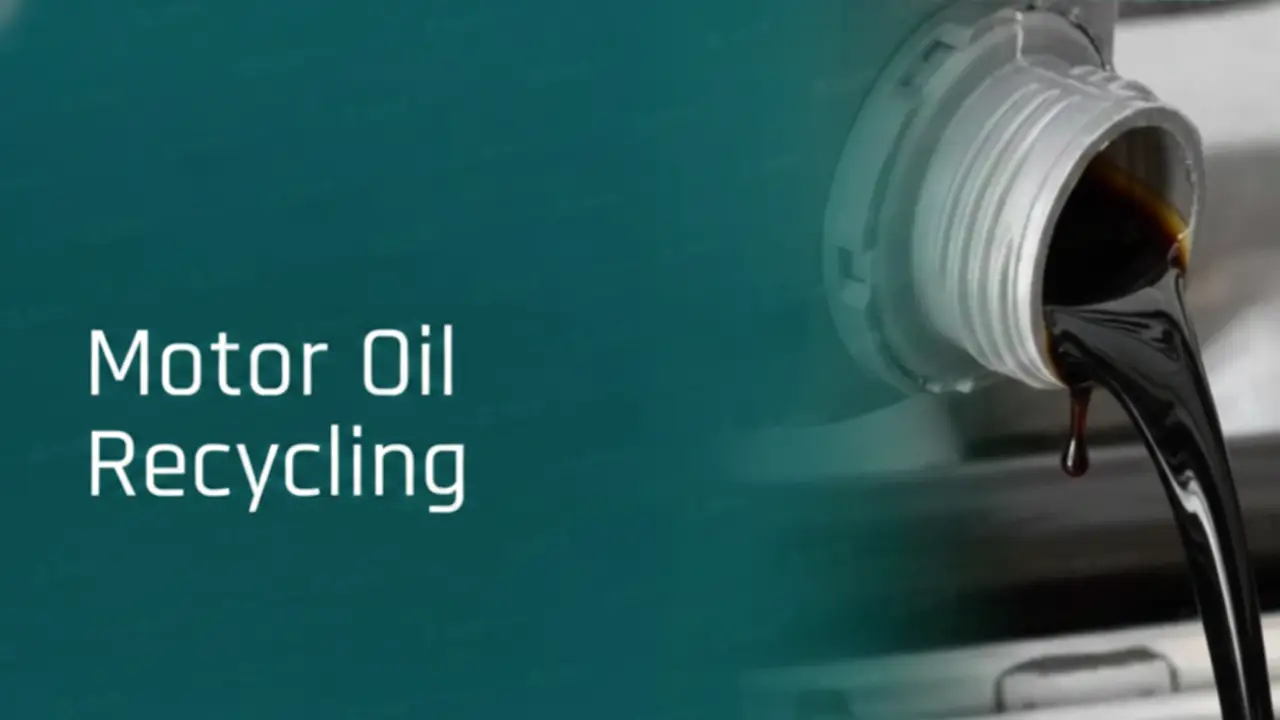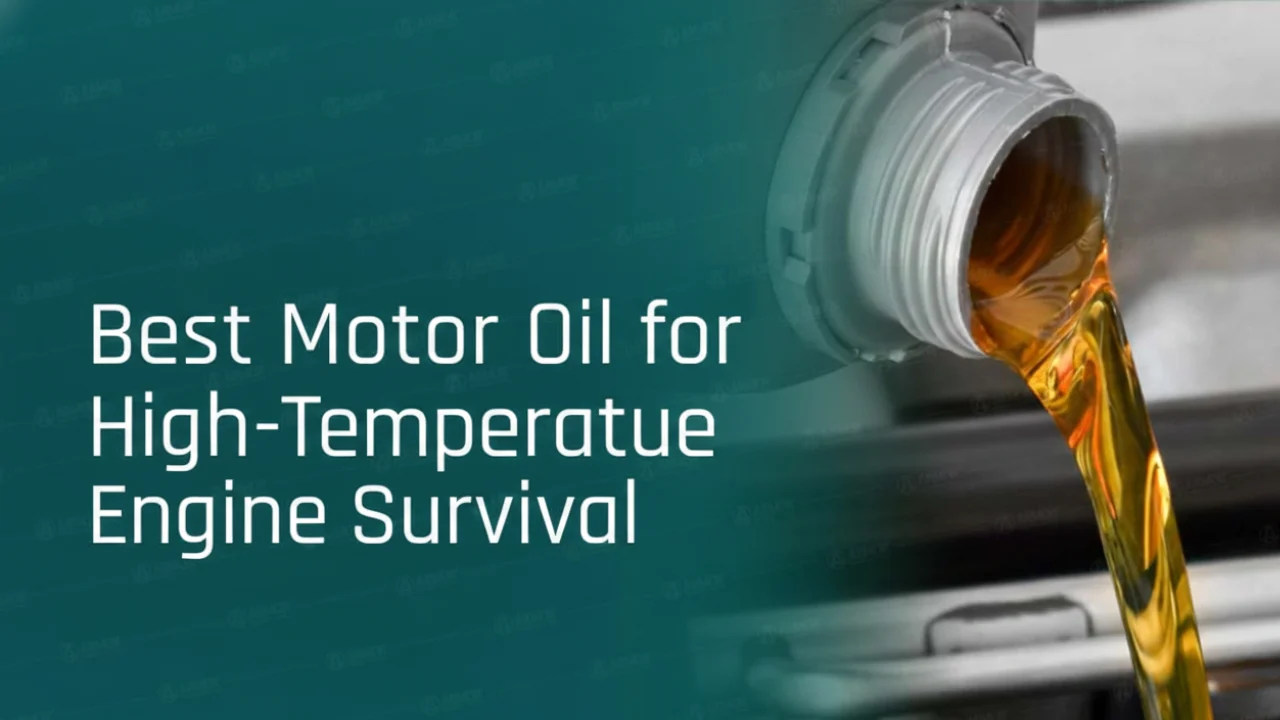- Armor Blog
- Consumer Education
- Top 5 Causes of Hydraulic System Failure
What are the Most Common Causes of Hydraulic System Failure?

Hydraulic systems are the lifelines of many industries, powering everything from construction machinery to manufacturing equipment. However, these systems are not immune to failure. Understanding and avoiding common pitfalls is key to maintaining their efficiency and longevity. Here are the top five causes of hydraulic system failure and how to prevent them.
Incorrect Oil Change Frequency
It’s a common misconception that hydraulic oil needs to be changed based on a set schedule. However, the need to change hydraulic oil depends more on its condition than on how long it’s been in use.
The correct way to determine the hydraulic oil change frequency is to listen to the oil carefully and monitor its condition because factors like the depletion of additives or degradation of the base oil are more accurate indicators.
To avoid this mistake, we advise you to perform a regular oil analysis. Its results are crucial for determining the right time to change the oil, and this tailored approach not only saves costs on supplies and maintenance downtime but also keeps the machinery in top condition.
Visual Representation – Causes of Hydraulic System Failure

Using the Wrong Hydraulic Fluid
The choice of hydraulic fluid should be tailored to specific working conditions and equipment usage. Hydraulic oil is sensitive to changes in temperature and prone to contamination, which can drastically affect its viscosity and performance.
For instance, oil that gets too hot may fail to lubricate properly, while oil that’s too cold could thicken and hinder machinery operation. So next time, when you decide to buy hydraulic oil AW 46 instead of Hydraulic Oil ISO 37, think twice or three times and consult with an experienced oil engineer or check the manual of your equipment for manufacturer recommendations.
Choosing the suitable hydraulic oil that can withstand the specific thermal conditions of your environment is essential for optimal machinery performance.
Neglecting Reservoir Maintenance
The hydraulic oil reservoir is often overlooked during maintenance. Thinking that emptying and cleansing this reservoir on a periodic basis is irrelevant to maintenance is a common mistake that causes disasters.
Over time, contaminants like sludge and debris can accumulate inside the tank, which can severely impact system performance or, worse, cause some parts to fail, leading to accidents at the site.
Regular draining and cleaning of the reservoir are vital. Oil analysis can reveal the presence of contaminants in a poorly maintained reservoir, signaling the need for a thorough clean-up.
Improper Filter Management
There are two types of mistakes that are related to the filter. The first is to overlook the importance of filter change, and the other is to excessively focus on changing it.
Changing hydraulic filters too frequently or infrequently can be counterproductive. Excessively frequent changes lead to unnecessary expenses and downtime, while delayed changes increase the risk of contaminants entering the system.
The frequency of filter change should also be based on the results of regular oil analysis, which helps in determining the optimal time for filter replacement and ensuring the filter’s dirt-holding capacity is fully utilized without overuse.
Lack of System Knowledge and Training
Despite their prevalence, many operators lack a thorough understanding of hydraulic systems. This gap in knowledge can lead to poor troubleshooting and maintenance practices, resulting in equipment damage or downtime. Ensuring that operators are well-trained in hydraulic system principles and maintenance is crucial. Keeping maintenance manuals and hydraulic schematics accessible and consulting experts for complex issues can prevent common mistakes and prolong system life.
Conclusion
Maintaining hydraulic systems is not just about routine checks and balances. It requires a deeper understanding of the system, a tailored approach to maintenance based on actual conditions, and continual learning and adaptation. By addressing these common causes of hydraulic system failure, you can significantly enhance the performance and lifespan of your hydraulic systems.
Armor Lubricants is a leading lubricant supplier in the UAE, offering advanced solutions to help businesses improve their performance and efficiency.




 Spear Lubricants
Spear Lubricants Armada lubricant
Armada lubricant Ace lubricants
Ace lubricants Perfect lubricants
Perfect lubricants Enzo lubricants
Enzo lubricants Lawrence lubricants
Lawrence lubricants